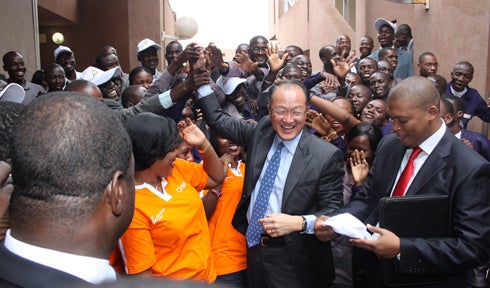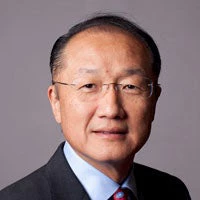Read this post in Español, Français, 中文, عربي
[[avp asset="/content/dam/videos/brad/2018/jun-2/jim_yong_kim_-_visit_to_cote_d_ivore_hd.flv"]]/content/dam/videos/brad/2018/jun-2/jim_yong_kim_-_visit_to_cote_d_ivore_hd.flv[[/avp]]
ABIDJAN, Cote d’Ivoire – At a jobs training center in this key capital city in West Africa, a young man showed me his newfound skills as an electrician. At a workshop, light bulbs flickered on and off. And then he told me something really important:
“It’s been 10 years since I graduated with my secondary school degree, and because of our conflict, I have never held a job. So this is a blessing to me,” said the young trainee. “But my brothers and sisters and so many people haven’t had this opportunity. I wonder how they can get jobs, too.”
On my first overseas trip as World Bank Group president and on my first official stop in Africa after spending years working on the continent, I came to Cote d’Ivoire thinking about how countries can emerge from years of conflict and become stable with vibrant economies. How does a fragile state lose its fragility?
That young man’s message gave me some important, concrete lessons.
The first was that for countries such as Cote d’Ivoire, which has emerged in the last year from a decade of conflict, the path to stability has to include the creation of many new jobs. (The World Bank funded this project that trained the young man as part of the $50 million Youth Employment and Young Entrepreneurs program.)
And the second was that so much more needs to be done here and elsewhere in Africa to create more jobs for youth. Across Africa, 7 to 10 million young people are added to the labor force each year. And while unemployment rates in general are high throughout the continent, unemployment rates for youth are shocking.
That may seem like a daunting problem and some may say it’s too difficult to provide jobs for millions of young Africans every year. But my stop in Cote d’Ivoire left me feeling optimistic that with strong leadership, a practical and results focused approach to economic development, and active engagement with the private sector, major positive change can happen. This country’s success would have a major impact on the region as well as the continent.
Here are three major impressions from the trip:
- I had a long discussion with President Alassane Ouattara, a former deputy managing director of the International Monetary Fund. His bold economic vision was inspiring to hear: achieve double-digit economic growth by 2014 and turn Cote d’Ivoire into an emerging economy by 2020. One of the critical tests now for all Ivoirians is to embrace peace and build on its first steps toward prosperity. The President and I agreed that to do so, all Ivoirians must turn their backs on conflict.
- I was humbled and moved by a meeting with a group of women leaders. The women included lawyers, a newspaper editor, the head of an all-female agricultural cooperative, and a leader of a women’s initiative for reconciliation. They told me – and I completely agree – that the only way that Cote d’Ivoire can build a sustainable economy is to put women at the center of the country’s rebuilding efforts.
- And at a visit at the Agroparc Industrial project, I saw the production of cashew nuts, cassava flour, medicinal herbs, and an energy efficient cook stove. This public-private initiative has made a strong impact by streamlining the production process, reducing costs and giving poor farmers much better access to local, regional, and even international markets. This World Bank funded effort has created many new economic opportunities for farmers in rural areas.
It was great to visit Cote d’Ivoire. It was wonderful to see a strong leader making important changes and working with the private sector to boost economic growth. We hope the reconciliation process will proceed and peace will be sustained.
As I leave this country, I know that we now must make sure that we bring successful pilot projects to scale. Cote d’Ivoire is ready and the World Bank Group will need to be ready as well.
Related Links:
- Photos: President Jim Yong Kim Visits Cote d'Ivoire
- Office of the President
- World Bank and Africa
- Transcript: World Bank Group President Jim Yong Kim Remarks at Joint Press Availability with President Ouattara
- Statement of World Bank Group President Jim Yong Kim to the Press Following a Visit to a Youth Training Center in Abidjan, Cote d'Ivoire
- Release: World Bank Group President Jim Yong Kim to Visit Côte d’Ivoire and South Africa Sept. 4 - 6



Join the Conversation